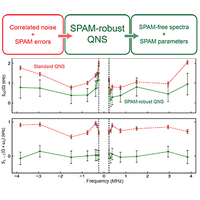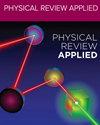不受状态制备和测量误差影响的多轴量子噪声光谱学
IF 3.8
2区 物理与天体物理
Q2 PHYSICS, APPLIED
引用次数: 0
摘要
描述时间相关噪声和 "非马尔可夫 "量子位动态是实现噪声定制误差缓解和最佳器件性能的关键先决条件。量子噪声光谱学可以提供噪声光谱特征的定量估算;然而,就其目前的形式而言,它极易受到执行非理想性的影响,特别是状态准备和测量(SPAM)误差。此外,现有的协议大多是针对以去相为主的噪声过程开发的,竞争性去相和弛豫效应在很大程度上没有考虑在内。我们介绍了受自旋锁定技术启发的量子噪声光谱学协议,该协议能够表征具有固定能量分裂的量子比特上的任意时间相关多轴噪声,同时还能抵御现实的静态 SPAM 误差。通过在数值模拟和基于云的 IBM 量子处理器上验证我们协议的性能,我们证明了本机噪声频谱成分的成功分离和估算以及 SPAM 误差率。我们发现,SPAM 误差会显著改变或掩盖重要的噪声特征,在经典噪声体系中,频谱被高估达 26.4%。一旦补偿了 SPAM 误差的影响,非经典噪声的明显特征就会在重建的 IBM-qubit 去相位频谱中表现出来。我们的工作为量子比特设备中现实噪声源的基准测试提供了及时的工具。本文章由计算机程序翻译,如有差异,请以英文原文为准。

Multiaxis quantum noise spectroscopy robust to errors in state preparation and measurement
Characterizing temporally correlated noise and “non-Markovian” qubit dynamics is a key prerequisite for achieving noise-tailored error mitigation and optimal device performance. Quantum noise spectroscopy can provide quantitative estimation of the noise spectral features; however, in its current form it is highly vulnerable to implementation nonidealities, notably, state preparation and measurement (SPAM) errors. Further to that, existing protocols have been mostly developed for dephasing-dominated noise processes, with competing dephasing and relaxation effects being largely unaccounted for. We introduce quantum noise spectroscopy protocols inspired by spin-locking techniques that enable the characterization of arbitrary temporally correlated multiaxis noise on a qubit with fixed energy splitting, while remaining resilient to realistic static SPAM errors. By validating the performance of our protocol in both numerical simulation and on cloud-based IBM quantum processors, we demonstrate the successful separation and estimation of native noise spectrum components as well as SPAM error rates. We find that SPAM errors can significantly alter or mask important noise features, with spectra overestimated by up to 26.4% in a classical noise regime. Clear signatures of nonclassical noise are manifest in the reconstructed IBM-qubit dephasing spectra, once SPAM-error effects are compensated for. Our work provides a timely tool for benchmarking realistic sources of noise in qubit devices.
求助全文
通过发布文献求助,成功后即可免费获取论文全文。
去求助
来源期刊

Physical Review Applied
PHYSICS, APPLIED-
CiteScore
7.80
自引率
8.70%
发文量
760
审稿时长
2.5 months
期刊介绍:
Physical Review Applied (PRApplied) publishes high-quality papers that bridge the gap between engineering and physics, and between current and future technologies. PRApplied welcomes papers from both the engineering and physics communities, in academia and industry.
PRApplied focuses on topics including:
Biophysics, bioelectronics, and biomedical engineering,
Device physics,
Electronics,
Technology to harvest, store, and transmit energy, focusing on renewable energy technologies,
Geophysics and space science,
Industrial physics,
Magnetism and spintronics,
Metamaterials,
Microfluidics,
Nonlinear dynamics and pattern formation in natural or manufactured systems,
Nanoscience and nanotechnology,
Optics, optoelectronics, photonics, and photonic devices,
Quantum information processing, both algorithms and hardware,
Soft matter physics, including granular and complex fluids and active matter.
 求助内容:
求助内容: 应助结果提醒方式:
应助结果提醒方式:


